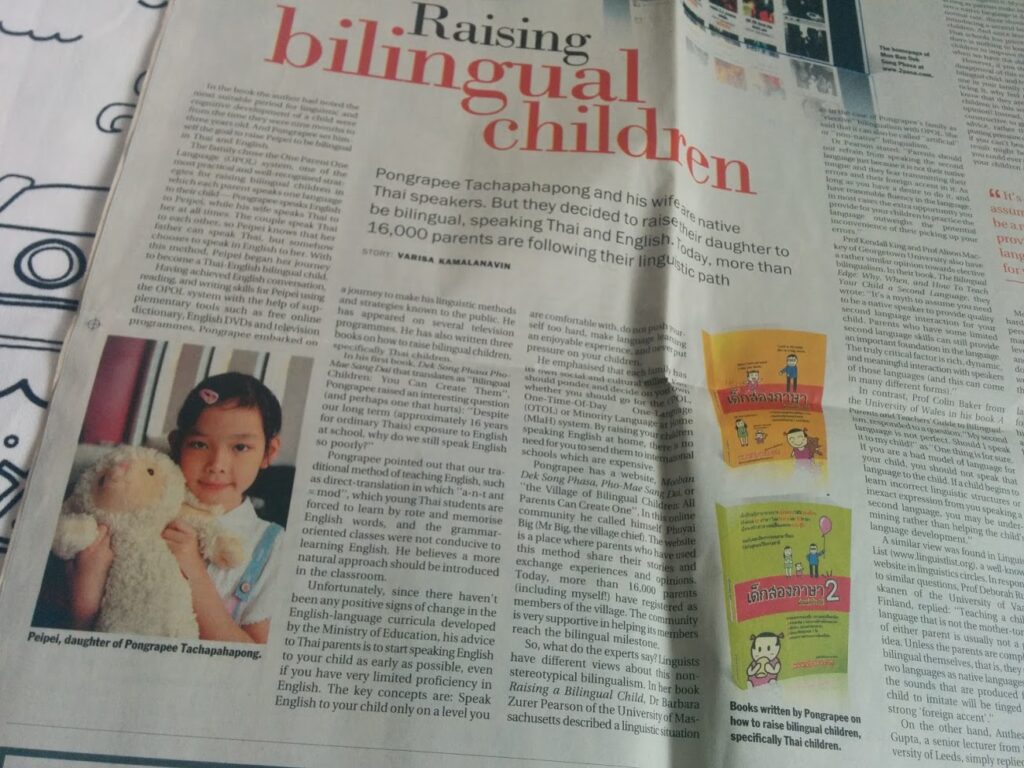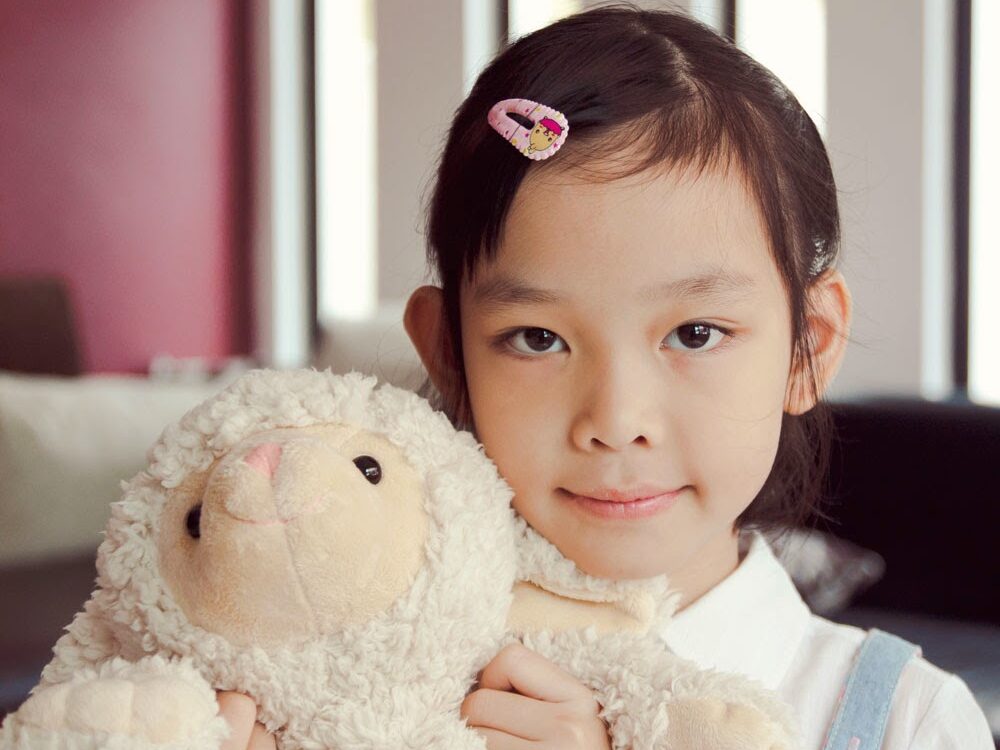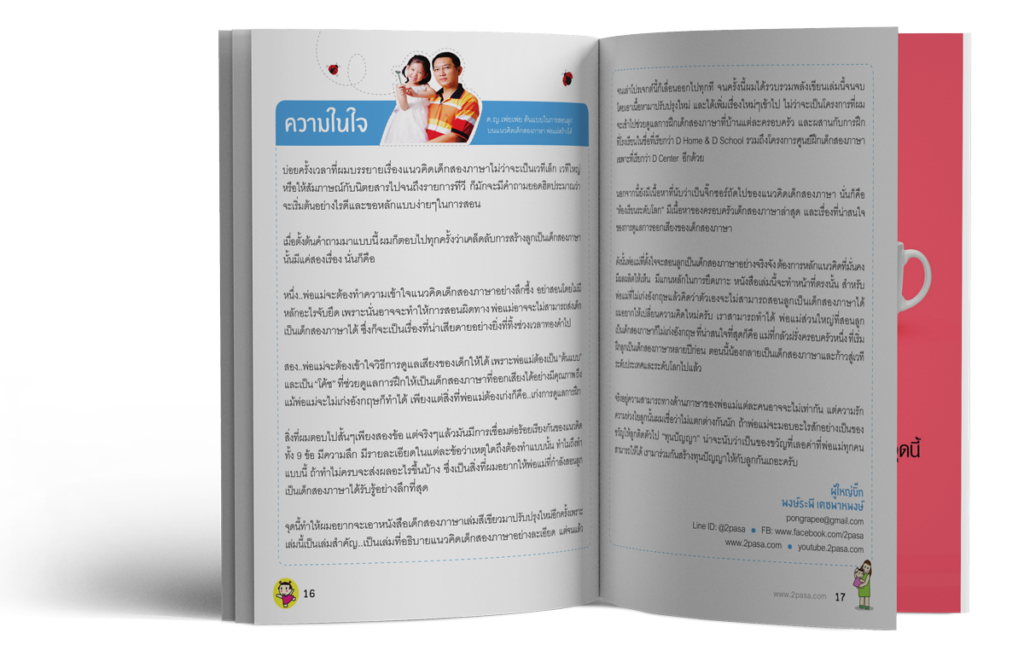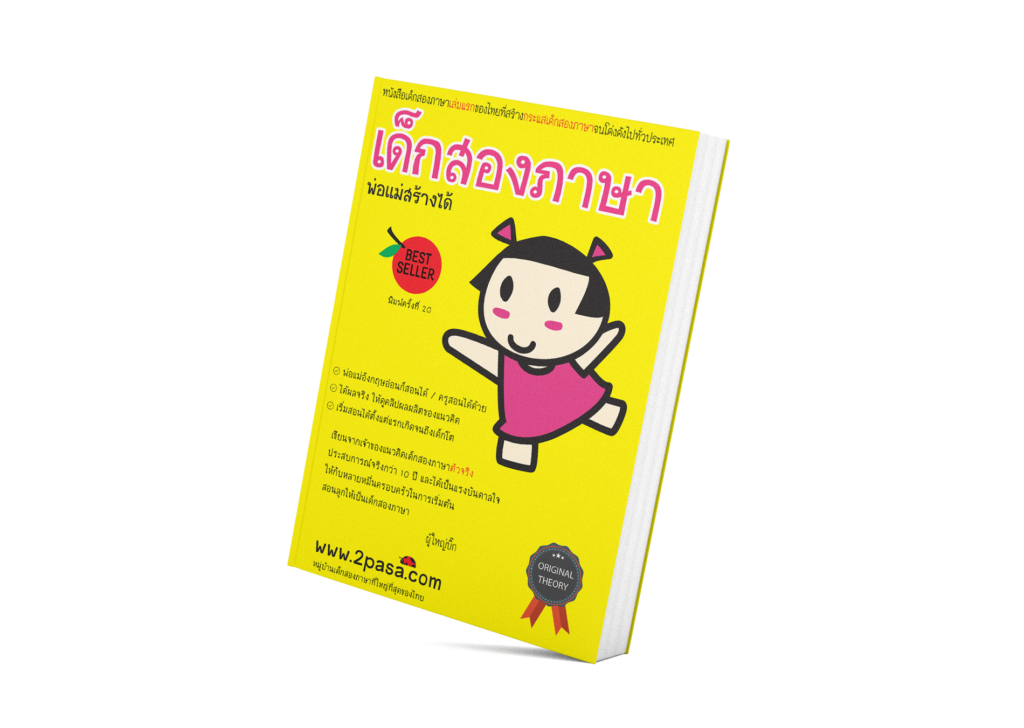Pongrapee Tachapahapong and his wife are native Thai speakers. But they decided to raise their daughter to be bilingual, speaking Thai and English. Today, more than 16,000 parents are following their linguistic path
published in Bangkok Post newspaper 2011
https://www.bangkokpost.com/tech/268363/raising-bilingual-children
Peipei is a six years old. She can speak, read and write Thai and English quite well for someone her age. Such ability is fairly common among children whose parents speak more than their native language. In that sense Peipei is no ordinary bilingual child as both her parents are native Thai speakers while English is their foreign language.

It all began five years ago when Pongrapee Tachapahapong, Peipei’s father, found an inspiring passage in a Japanese book authored by Masaru Ibuka and translated into Thai under the title Kwa Ja Ruu Kor Sai Sia Laew , or “kindergarten is too late”. The book completely changed his perspective towards learning English as a second language.
In the book the author had noted the most suitable period for linguistic and cognitive development of a child were from the time they were nine months to three years old. And Pongrapee set himself the goal to raise Peipei to be bilingual in Thai and English.

The family chose the One Parent One Language (OPOL) system, one of the most practical and well-recognised strategies for raising bilingual children in which each parent speaks one language to their child _ Pongrapee speaks English to Peipei, while his wife speaks Thai to her at all times. The couple speak Thai to each other, so Peipei knows that her father can speak Thai, but somehow chooses to speak in English to her. With this method, Peipei began her journey to become a Thai-English bilingual child.
Having achieved English conversation, reading, and writing skills for Peipei using the OPOL system with the help of supplementary tools such as free online dictionary, English DVDs and television programmes, Pongrapee embarked on a journey to make his linguistic methods and strategies known to the public. He has appeared on several television programmes. He has also written three books on how to raise bilingual children, specifically Thai children.
In his first book, Dek Song Phasa Pho-Mae Sang Dai that translates as “Bilingual Children: You Can Create Them”, Pongrapee raised an interesting question (and perhaps one that hurts): “Despite our long term (approximately 16 years for ordinary Thais) exposure to English at school, why do we still speak English so poorly?”

Pongrapee pointed out that our traditional method of teaching English, such as direct-translation in which “a-n-t ant = mod”, which young Thai students are forced to learn by rote and memorise English words, and the grammar-oriented classes were not conducive to learning English. He believes a more natural approach should be introduced in the classroom.
Unfortunately, since there haven’t been any positive signs of change in the English-language curricula developed by the Ministry of Education, his advice to Thai parents is to start speaking English to your child as early as possible, even if you have very limited proficiency in English. The key concepts are: Speak English to your child only on a level you are comfortable with, do not push yourself too hard, make language learning an enjoyable experience, and never put pressure on your children.
He emphasised that each family has its own social and cultural milieu. You should ponder and decide on your own whether you should go for the OPOL, One-Time-Of-Day One-Language (OTOL) or Minority Language at Home (MlaH) system. By raising your children speaking English at home, there is no need for you to send them to international schools which are expensive.
He emphasised that each family has its own social and cultural milieu. You should ponder and decide on your own whether you should go for the OPOL, One-Time-Of-Day One-Language (OTOL) or Minority Language at Home (MlaH) system. By raising your children speaking English at home, there is no need for you to send them to international schools which are expensive.
So, what do the experts say? Linguists have different views about this non-stereotypical bilingualism. In her book Raising a Bilingual Child, Dr Barbara Zurer Pearson of the University of Massachusetts described a linguistic situation as in the case of Pongrapee’s family as “elective” bilingualism with OPOL. She said that it can also be called “artificial” or “non-native” bilingualism.

Dr Pearson stated: “Parents should not refrain from speaking the second language just because it is not their native tongue and they fear transmitting their errors and their foreign accent in it. As long as you have a desire to do it, and have reasonable fluency in the language, in most cases the extra opportunity you provide for your children to practice the language outweighs the potential inconvenience of their picking up your errors.”
Prof Kendall King and Prof Alison Mackey of Georgetown University also have a rather similar opinion towards elective bilingualism. In their book, The Bilingual Edge: Why, When, and How To Teach Your Child a Second Language, they wrote: “It’s a myth to assume you need to be a native speaker to provide quality second language interaction for your child. Parents who have some limited second language skills can still provide an important foundation in the language. The truly critical factor is rich, dynamic, and meaningful interaction with speakers of those languages (and this can come in many different forms).”
In contrast, Prof Colin Baker from the University of Wales in his book A Parents and Teachers’ Guide to Bilingualism, responded to a question: “My second language is not perfect. Should I speak it to my child?” as “One thing is for sure. If you are a bad model of language for your child, you should not speak that language to the child. If a child begins to learn incorrect linguistic structures or inexact expression from you speaking a second language, you may be undermining rather than helping the child’s language development.”
A similar view was found in Linguist List (www.linguistlist.org), a well-known website in linguistics circles. In response to similar questions, Prof Deborah Ruuskanen of the University of Vaasa, Finland, replied: “Teaching a child a language that is not the mother-tongue of either parent is usually not a good idea. Unless the parents are completely bilingual themselves, that is, they speak two languages as native languages, then the sounds that are produced for the child to imitate will be tinged with a strong ‘foreign accent’.”
On the other hand, Anthea Fraser Gupta, a senior lecturer from the University of Leeds, simply replied: “Don’t worry; be natural; be a parent.”
Whatever view one has about this so-called elective/artificial/non-native bilingualism, certainly there has not yet been any tangible evidence that supports it or argues against it. My opinion is that as long as parents make sure their children’s native language is developing at a normal rate, there should be no risk in introducing a second language to their children. And since learning English in Thai schools has proven unsuccessful, there is nothing to lose by helping our children to improve their English skills when we have the ability to do so.
However, if you shook your head in disapproval of this method of raising a bilingual child, and by any chance someone in your family was seriously practicing it, why feel resentful when you know that they are going to raise their children in this way regardless of your opinion? Instead, I think that it is more constructive to give them support and advice, rather than discouraging and putting pressure on them. In other words, if you can’t beat them, join them! The result might be more rewarding than you could ever imagine in terms of what your children are capable of.
Most linguists agree that it is very hard to find an ideal balanced bilingual person who has the same levels of command in both languages, with the same levels of listening, speaking, reading, and writing skills. As such, we (Thais) don’t have to expect that our children would become perfectly bilingual in all those skills.
A better speaking skill in a second language could already be satisfactory for some parents who don’t aim too high. I totally agree with Pongrapee that as long as the English environment at home is pleasant and enjoyable, no damage would come to your children.
It has been said that second or foreign-language learning is an endless task. The future of English proficiency practiced by non-native bilingual families, those 16,000 families in Pongrapee’s online village, is yet to be known. But I think Pongrapee deserves a round of applause for the devotion to his daughter, and for bringing to our Thai society an alternative method for learning English, when English-language classrooms in Thailand are as yet far from satisfactory.
Varisa Kamalanavin, PhD, is associate professor at the Department of Linguistics, Thammasat University (yogvari@yahoo.com)
